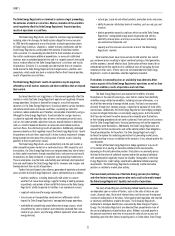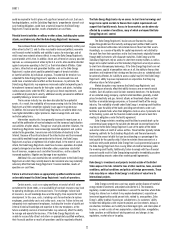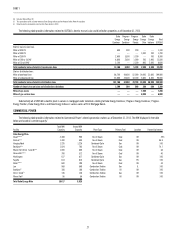Duke Energy 2012 Annual Report Download - page 40
Download and view the complete annual report
Please find page 40 of the 2012 Duke Energy annual report below. You can navigate through the pages in the report by either clicking on the pages listed below, or by using the keyword search tool below to find specific information within the annual report.
PART I
20
required to shut down or alter the operation of their facilities, which may
cause the Duke Energy Registrants to incur losses. Further, the Duke Energy
Registrants’ regulatory rate structure and their contracts with customers may
not necessarily allow for the recovery of capital costs incurred to comply with
new environmental regulations. Also, the Duke Energy Registrants may not
be able to obtain or maintain from time to time all required environmental
regulatory approvals for their operating assets or development projects. Delays
in obtaining any required environmental regulatory approvals, failure to obtain
and comply with them or changes in environmental laws or regulations to
more stringent compliance levels could result in additional costs of operation
for existing facilities or development of new facilities being prevented, delayed
or subject to additional costs. Although it is not expected that the costs of
complying with current environmental regulations will have a material adverse
effect on the Duke Energy Registrants’ fi nancial position, results of operations
or cash fl ows, no assurance can be made that the costs of complying with
environmental regulations in the future will not have such an effect.
The EPA has proposed new federal regulations governing the management
of coal combustion by-products, including fl y ash. These regulations may
require the Duke Energy Registrants to make additional capital expenditures and
increase operating and maintenance costs.
Other potential new environmental regulations, limiting the use of coal
acquired from mountaintop removal and imposing additional requirements on
water discharges associated with mountaintop removal, could increase costs of
fuel and require the Duke Energy Registrants to make additional related capital
expenditures. In addition, the Duke Energy Registrants are generally responsible
for on-site liabilities, and in some cases off-site liabilities, associated with
the environmental condition of their power generation facilities and natural
gas assets acquired or developed, regardless of when the liabilities arose and
whether they are known or unknown. In connection with some acquisitions
and sales of assets, the Duke Energy Registrants may obtain, or be required
to provide, indemnifi cation against some environmental liabilities. If the Duke
Energy Registrants incur a material liability, or the other party to a transaction
fails to meet its indemnifi cation obligations, the Duke Energy Registrants could
suffer material losses.
The Duke Energy Registrants’ sales may decrease if they are unable to gain
adequate, reliable and affordable access to transmission assets.
The Duke Energy Registrants depend on transmission and distribution
facilities owned and operated by utilities and other energy companies to deliver
electricity sold to the wholesale market. FERC’s power transmission regulations,
as well as those of Duke Energy’s international markets, require wholesale electric
transmission services to be offered on an open-access, non-discriminatory basis.
If transmission is disrupted, or if transmission capacity is inadequate, the Duke
Energy Registrants’ ability to sell and deliver products may be hindered.
The different regional power markets have changing regulatory structures,
which could affect the Duke Energy Registrants’ growth and performance in
these regions. In addition, the independent system operators who oversee the
transmission systems in regional power markets have imposed in the past,
and may impose in the future, price limitations and other mechanisms to
address volatility in the power markets. These types of price limitations and
other mechanisms may adversely impact the profi tability of the Duke Energy
Registrants’ wholesale power marketing business.
The Duke Energy Registrants must meet credit quality standards and there is
no assurance that they and their rated subsidiaries will maintain investment
grade credit ratings. If the Duke Energy Registrants or their rated subsidiar-
ies are unable to maintain investment grade credit ratings, they would be
required under credit agreements to provide collateral in the form of letters
of credit or cash, which may materially adversely affect their liquidity.
Each of the Duke Energy Registrants and their rated subsidiaries’ senior
unsecured long-term debt is currently rated investment grade by various
rating agencies. The Duke Energy Registrants cannot be sure that their senior
unsecured long-term debt or that of their rated subsidiaries will be rated
investment grade in the future.
If the rating agencies were to rate the Duke Energy Registrants or their
rated subsidiaries below investment grade, the entities’ borrowing costs would
increase, perhaps signifi cantly. In addition, their potential pool of investors and
funding sources would likely decrease. Further, if the Duke Energy Registrants’
short-term debt rating were to fall, access to the commercial paper market
could be signifi cantly limited. Any downgrade or other event negatively affecting
the credit ratings of the Duke Energy Registrants’ subsidiaries could make their
costs of borrowing higher or access to funding sources more limited, which
in turn could increase their need to provide liquidity in the form of capital
contributions or loans to such subsidiaries, thus reducing the liquidity and
borrowing availability of the consolidated group. A reduction in liquidity and
borrowing availability could ultimately impact the ability to indefi nitely reinvest
the earnings of its international operations, which could result in signifi cant
income taxes that would have a material adverse effect on Duke Energy’s
results of operations.
A downgrade below investment grade could also require the Duke Energy
Registrants to post additional collateral in the form of letters of credit or cash
under various credit agreements and trigger termination clauses in some
interest rate derivative agreements, which would require cash payments. All
of these events would likely reduce the Duke Energy Registrants’ liquidity and
profi tability and could have a material adverse effect on their fi nancial position,
results of operations or cash fl ows.
The Duke Energy Registrants are exposed to credit risk of the customers
and counterparties with whom they do business.
Adverse economic conditions affecting, or fi nancial diffi culties of,
customers and counterparties with whom the Duke Energy Registrants do
business could impair the ability of these customers and counterparties to
pay for services or fulfi ll their contractual obligations, including loss recovery
payments under insurance contracts, or cause them to delay such payments
or obligations. The Duke Energy Registrants depend on these customers and
counterparties to remit payments on a timely basis. Any delay or default in
payment could adversely affect the Duke Energy Registrants’ cash fl ows,
fi nancial position or results of operations.
The Duke Energy Registrants’ operating results may fl uctuate on a
seasonal and quarterly basis and can be negatively affected by changes in
weather conditions and severe weather.
Electric power generation is generally a seasonal business. In most parts
of the U.S., and other markets in which Duke Energy operates, demand for power
peaks during the warmer summer months, with market prices typically peaking
at that time. In other areas, demand for power peaks during the winter. Further,
extreme weather conditions such as heat waves or winter storms could cause
these seasonal fl uctuations to be more pronounced. As a result, in the future,
the overall operating results of the Duke Energy Registrants’ businesses may
fl uctuate substantially on a seasonal and quarterly basis and thus make
period-to-period comparison less relevant.
Sustained severe drought conditions could impact generation by the
Duke Energy Registrants’ hydroelectric plants, as well as their fossil and
nuclear plant operations, as these facilities use water for cooling purposes
and for the operation of environmental compliance equipment. Furthermore,
destruction caused by severe weather events, such as hurricanes, tornadoes,
severe thunderstorms, snow and ice storms, can result in lost operating
revenues due to outages; property damage, including downed transmission
and distribution lines; and additional and unexpected expenses to mitigate
storm damage.
























